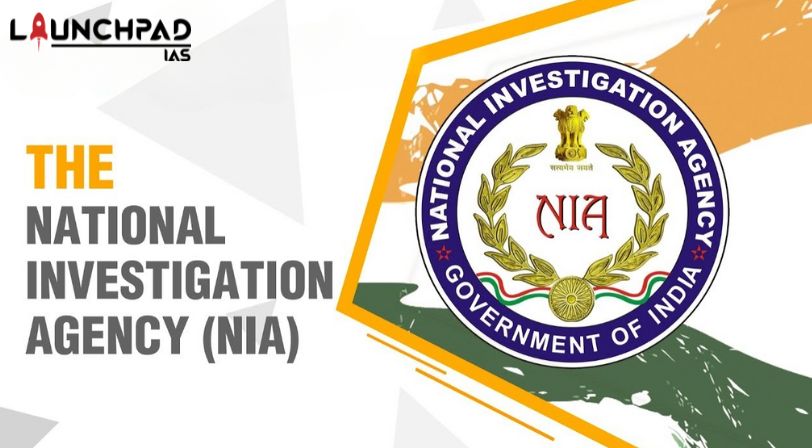About
- The National Investigation Agency (NIA) is the Central Counter-Terrorism Law Enforcement Agency of India mandated to investigate all the offenses affecting the sovereignty, security, and integrity of India. It includes:
- Friendly relations with foreign states.
- Against atomic and nuclear facilities.
- Smuggling of arms, drugs fake Indian currency, and infiltration from across the borders.
- The offenses under the statutory laws enacted to implement international treaties, agreements, conventions, and resolutions of the United Nations, its agencies, and other international organizations.
- It was constituted under the National Investigation Agency (NIA) Act, 2008.
- The agency is empowered to deal with the investigation of terror-related crimes across states without special permission from the states under a written proclamation from the Ministry of Home Affairs.
- Headquarters: New Delhi
Origin
- In the wake of the 26/11 Mumbai terror attack in November 2008, which shocked the entire world, the then United Progressive Alliance government decided to establish the NIA.
- In December 2008, former Union Home Minister P. Chidambaram introduced the National Investigation Agency Bill.
- The agency came into existence on 31st December 2008 and started its functioning in 2009. To date, the NIA has registered 447 cases.
Jurisdiction
- The law under which the agency operates extends to the whole of India and also applies to Indian citizens outside the country.
- Persons in the service of the government wherever they are posted.
- Persons on ships and aircraft registered in India wherever they may be.
- Persons who commit a scheduled offense beyond India against the Indian citizen or affecting the interest of the Indian state.
How does the NIA take up a probe?
State government
- As provided under Section 6 of the Act, State governments can refer the cases about the scheduled offenses registered at any police station to the Central government (Union Home Ministry) for NIA investigation.
- After assessing the details made available, the Centre can then direct the agency to take over the case.
- State governments are required to extend all assistance to the NIA.
Central government
- In India: When the Central government thinks that a scheduled offense has been committed that is required to be investigated under the Act, it may, suo motu, direct the agency to take up the probe.
- Outside India: Where the Central government finds that a scheduled offense has been committed at any place outside India to which this Act extends, it can also direct the NIA to register the case and take up an investigation.
Sanction
- For prosecuting the accused under the Unlawful Activities (Prevention) Act, 1967 (UAPA) and certain other scheduled offences, the Agency seeks the sanction of the Central Government.
- The sanction is granted under the UAPA based on the report of the ‘Authority’ constituted under section 45 (2) of the UAPA.
Other
- There is an exclusive Left Wing Extremism (LWE) cell to effectively deal with cases related to terror financing aspects of Naxalite groups.
- While investigating any scheduled offence, the agency can also investigate any other offence which the accused is alleged to have committed if the offence is connected to the scheduled offence.
- After investigation, the cases are placed before the NIA Special Court.
What is NIA Special Courts?
The Central Government for the trial of Scheduled Offences constitutes one or more Special Courts under Section 11 and 22 of the NIA Act 2008.
Composition:
- The Special Court shall be presided over by a judge to be appointed by the Central Government on the recommendation of the Chief Justice of the High Court.
- The Central Government may, if required, appoint an additional judge or additional judges to the Special Court, on the recommendation of the Chief Justice of the High Court.
Jurisdiction of Special Courts:
- The Special Courts have all powers of the court of sessions under the Code of Criminal Procedure, 1973.
- Where any question arises as to the jurisdiction of any Special Court, it shall be referred to the Central Government whose decision in the matter shall be final.
- The Supreme Court can transfer a case pending before a Special Court to any other Special Court within that State or any other State in some exceptional cases where it is not feasible to conduct a peaceful, fair, impartial and speedy trial.
- Similarly, the High Court has the power to transfer a case pending before a Special Court in a State to any other Special Court within that State.
Recent Amendments in the NIA Act:
- NIA was amended in 2019 with the objective of speedy investigation and prosecution of certain offences, including those committed outside India.
- The amendment focussed on three main areas:
Offences outside India:
- The original Act allowed NIA to investigate and prosecute offences within India
- The Amended Act empowered the agency to investigate offences committed outside India, subject to international treaties and domestic laws of other countries.
Widening the scope of Law:
- The amendment has allowed the NIA to investigate, in addition, cases related to:
- Human trafficking
- Counterfeit currency or banknotes
- Manufacture or sale of prohibited arms
- Cyber-terrorism
- Offences under the Explosive Substances Act, 1908.
- Special Courts:
- The 2008 Act constituted Special Courts for conducting the trial of offences under the Act.
- The 2019 amendment allowed the central government to designate Sessions Courts as Special Courts for the trial of scheduled offences under the Act.
- The central government is required to consult the Chief Justice of the High Court under which the Sessions Court is functioning, before designating it as a Special Court.
- State governments may also designate Sessions Courts as Special Courts for the trial of scheduled offences.


